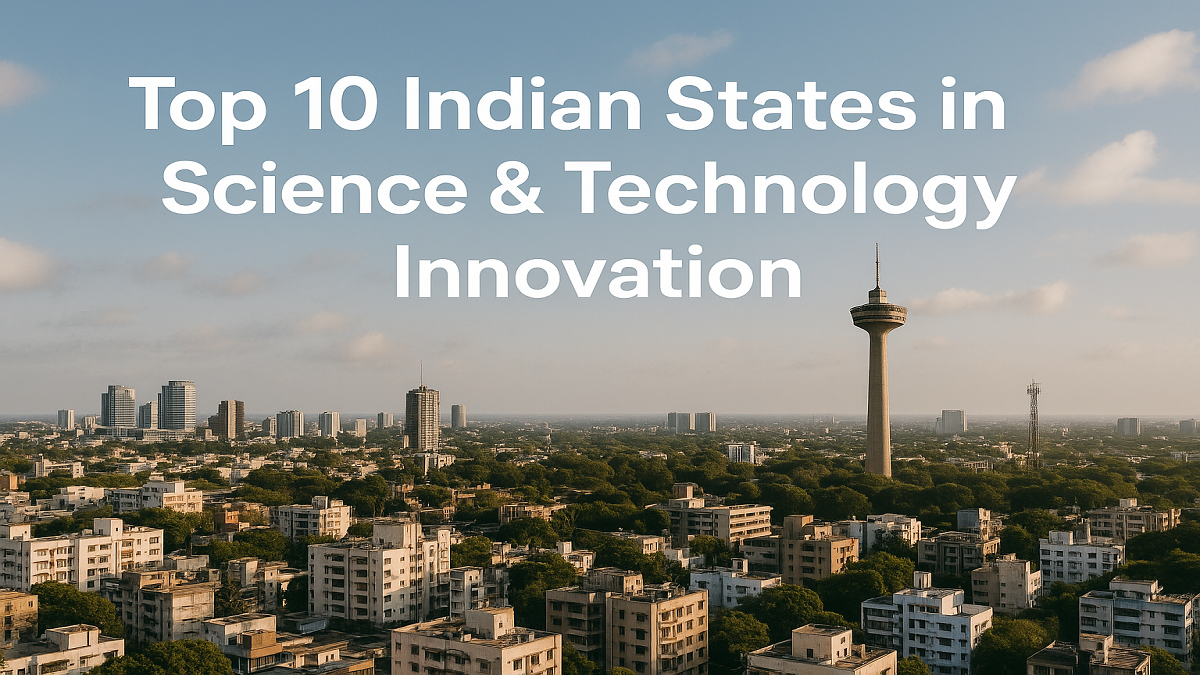India’s progress in science and technology has significantly influenced its growth as a knowledge-driven economy. Several states have emerged as pioneers in fostering research, innovation, and digital transformation. These states are not only home to leading technology hubs and research institutions but also encourage startups, industry collaboration, and public-private partnerships to accelerate scientific advancements.
This article highlights the top 10 Indian states leading in science and technology innovation, based on factors like R&D output, startup ecosystems, tech infrastructure, and educational excellence.
Top 10 Indian States in Innovation
| Rank | State | Key Innovation Strengths |
|---|---|---|
| 1 | Karnataka | IT, aerospace, biotech, AI |
| 2 | Telangana | AI, life sciences, startup ecosystem |
| 3 | Haryana | Industrial automation, green tech |
| 4 | Maharashtra | FinTech, pharmaceuticals, electronics |
| 5 | Tamil Nadu | Manufacturing innovation, automotive tech |
| 6 | Delhi | Public policy, health tech, research institutions |
| 7 | Gujarat | Industrial R&D, process innovation |
| 8 | Andhra Pradesh | E-governance, electronics, digital education |
| 9 | Kerala | Digital health, biotech, inclusive technology |
| 10 | Chandigarh | Smart governance, citizen-centric urban innovation |
Karnataka – The Innovation Powerhouse
Karnataka stands as India’s leading state in innovation. The capital city, Bengaluru, often called the Silicon Valley of India, hosts numerous multinational IT companies, research labs, and over ten thousand startups. The state supports its innovation ecosystem with dedicated policies, technology parks, incubators, and a highly skilled talent pool.
Karnataka’s commitment to innovation is visible in its leadership across IT services, biotechnology, aerospace engineering, and machine learning. The presence of top educational institutions and R&D centers further strengthens its position.
Telangana – A Rapidly Growing Tech Ecosystem
Telangana has rapidly grown into a dynamic center of innovation, especially in the field of emerging technologies like artificial intelligence, blockchain, and data analytics. Hyderabad, the state’s capital, has attracted major tech investments and is a major hub for pharmaceutical and life sciences research.
The state government actively promotes innovation through startup accelerators, innovation hubs, and university-linked research programs, making Telangana one of the most innovation-friendly states in India.
Haryana – Industry-Backed Innovation
Haryana has carved out a strong position in India’s innovation landscape through its thriving industrial zones and technology parks. The state encourages collaboration between universities and private industry to fuel research in automation, green energy, and robotics.
With a growing number of innovation labs, skill development programs, and IT corridors, Haryana continues to strengthen its innovation infrastructure.
Maharashtra – Combining Finance and Science
Maharashtra, with Mumbai as its commercial capital and Pune as an academic hub, brings together financial strength and research excellence. The state plays a key role in sectors like financial technology, pharmaceuticals, digital media, and electronics.
Innovation in Maharashtra is supported by industrial clusters, international collaborations, and a vibrant startup environment. Research initiatives in renewable energy and smart city technology are also growing rapidly.
Tamil Nadu – Manufacturing Meets Research
Tamil Nadu has long been known for its industrial prowess. Today, the state effectively combines manufacturing excellence with scientific research and innovation. Chennai, Coimbatore, and other cities support high-tech industries in automotive, electronics, and healthcare.
With multiple engineering colleges and technical universities, Tamil Nadu drives innovation in automation, AI, and advanced materials, making it a strong player in India’s science and technology development.
Delhi – The Knowledge Capital
The National Capital Territory of Delhi excels in knowledge-based industries and houses many premier research institutions and think tanks. The region supports a growing number of startups and research projects in healthcare, energy, and environmental technology.
Its educated population and policy-driven governance make Delhi an important contributor to national scientific goals, especially in public policy, social innovation, and green technologies.
Gujarat – Innovation in Industry and Research
Gujarat blends industrial development with strong innovation policies. The state supports sectors such as chemicals, engineering, and textiles with science-driven innovation models. Increasing investment in research parks and technology transfer centers helps Gujarat scale its innovation capabilities.
Educational institutions and industry partnerships across the state are actively engaged in applied research, automation, and process improvement.
Andhra Pradesh – Digitally Driven Growth
Andhra Pradesh is embracing digital transformation through e-governance, smart infrastructure, and data-driven services. The state has developed dedicated IT corridors and electronics manufacturing clusters to support technology-led development.
The focus on digital education, cloud computing, and rural innovation has made Andhra Pradesh one of the emerging states in India’s innovation landscape.
Kerala – Fostering Digital Science and Biotechnology
Kerala has made impressive strides in digital science, health tech, and biotechnology. Known for its high literacy and strong healthcare system, the state integrates scientific innovation with social progress.
Kerala’s initiatives in electronics design, digital learning, and biotechnology are supported by specialized parks and research centers. The push for sustainable and inclusive technologies also gives it a unique identity in the innovation sector.
Chandigarh – Smart Governance and Urban Innovation
Chandigarh, though a Union Territory, deserves recognition for its emphasis on urban innovation and governance technologies. The city has adopted smart city frameworks, digital citizen services, and efficient waste and water management systems.
It promotes innovation through urban design labs, public technology platforms, and partnerships with academic institutions, making it a model of technology-driven administration.



 NIM–JIM&WS Team Successfully Summits...
NIM–JIM&WS Team Successfully Summits...
 Gamini Gives Birth to Three Cubs at Kuno...
Gamini Gives Birth to Three Cubs at Kuno...
 Shashi Tharoor Conferred Honorary D.Litt...
Shashi Tharoor Conferred Honorary D.Litt...








